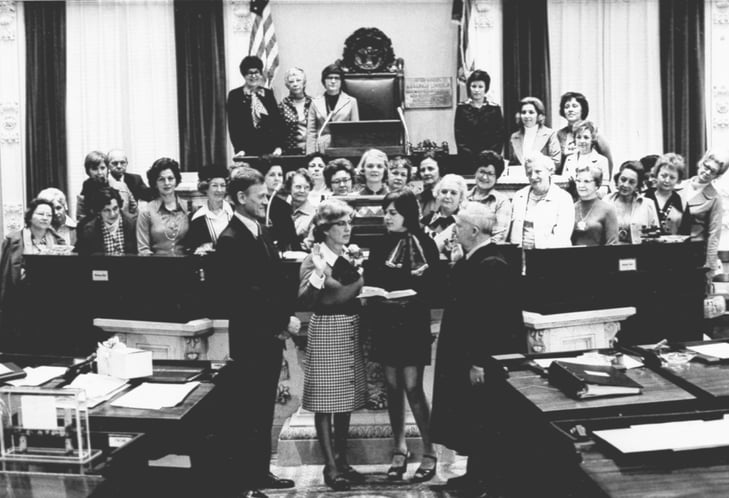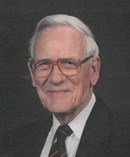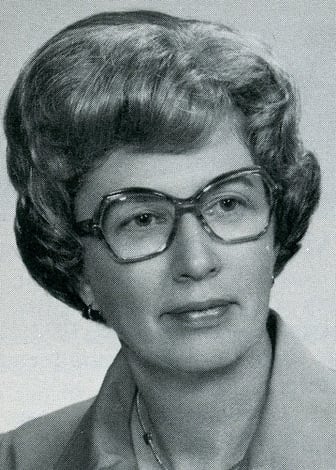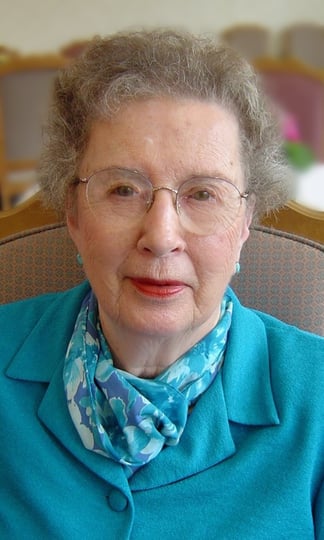 “All my supporters came to Columbus to watch my swearing in ceremony.
“All my supporters came to Columbus to watch my swearing in ceremony.
That’s Jack, me, my daughter and the Chief Justice.”
— Helen Fix, Ohio House of Representatives, 1974 - 1982
Helen Fix is a storied name in Ohio’s political annals. In 1981, during her fourth consecutive term in the General Assembly, she became the first woman to serve as the Republican Party’s House whip.
Shortly before her 95th birthday, we spoke with Ms. Fix — now retired and residing at Deupree Cottages in Hyde Park — and asked her to share recollections on her career. She had some surprising things to say.
The war years
Born in 1922, Helen Fix (née Herrink) grew up in Richmond, Virginia. She always loved to write. English was her favorite subject in high school. She taught herself to type.
Fix attended the University of Richmond’s Westhampton College, initially majoring in English and history because the dean considered journalism “unsuitable” for women, she said. While she was there, however, the United States entered the Second World War.
With many men enlisted or drafted into service, Fix found that paths previously closed to her were suddenly open. When the university relaxed its gender restrictions, she enrolled in journalism courses, eventually becoming the first woman to serve as chief editor of the student newspaper.
Fix graduated in 1943. Her alma mater would later honor her with its Alumni Award for Distinguished Service.
One summer, while staying at her family’s summer cabin at a state park beach, she met John “Jack” Fix (Pictured)— the man she would marry. He was from Lexington, Virginia, and a student at Washington & Lee University.
 Jack enlisted in the Navy during the war. In July 1942, while serving aboard PC-556, a patrol craft in the Gulf of Mexico, he assisted in hunting down and sinking the German submarine U-166, which had torpedoed the passenger steamer his ship had been escorting.
Jack enlisted in the Navy during the war. In July 1942, while serving aboard PC-556, a patrol craft in the Gulf of Mexico, he assisted in hunting down and sinking the German submarine U-166, which had torpedoed the passenger steamer his ship had been escorting.
He was then ordered to Cornell University for training as a PT boat skipper and, in 1944, redeployed to the South Pacific, where he finished out his war service.
Helen and Jack were married just before he left, and she moved to Texas to take a job as a reporter for the Corpus Christi Caller-Times. But she was lonely waiting for her husband to return to the U.S.
“It took him a long time to get home,” she said, because several months passed before he accumulated the service points required for demobilization.
When Jack returned, he did so with a new job offer — as a product development man for Procter & Gamble in Cincinnati.
So, the couple moved to the Queen City, where they remained together for the next 73 years. Jack passed away earlier this year.
Resuming her journalism career
Arriving in Cincinnati in 1946, the couple set about raising a family. Fix paused her journalism career for the next 15 years to raise their three children.
“I did some [part-time] work for a merchandising company that represented DuPont,” she remembered. “It was kind of a sales job. Then I went back to the newspaper. That was my first love anyway.“
Fix said she was offered a job with The Cincinnati Post in the early 1960s, but turned it down because the paper’s daily publication schedule was too much to handle while she still worked as a full-time mother.
Instead, she took a position writing for the Pleasant Ridge Reporter-Press and, later, Community Press’s Northeast Suburban Life because both papers were weeklies. She covered village council meetings, school issues and local news.
“I wrote a column called ‘Life on the Suburban Scene,’ and I got some scoops,” she recalled.
For example, Fix said, “There was a parcel of land between Lester Road and Montgomery and the developers were going to put a development in there.”
“I heard about it and nobody else knew about it,” she said, smiling wryly. “There was a great big meeting and I got the scoop. I was pretty proud of that. I got another scoop [about the hiring of a] new police chief of Madeira. I got that first. Nobody else had it. I felt good about that.”
The power of perseverance
Being so closely connected, through her job, to life in the community allowed Fix to see inefficiencies and needs, which she began to wish she could directly address. That subsequently led her into public service.
“I covered a lot of city councils and I got interested in government,” she said.
When one local politician campaigned strongly against a school levy that Fix supported, she felt compelled to speak out.
“[He] had a sign truck that went up and down Ridge Road telling people to vote against the Cincinnati school levy and that kind of bothered me,” she said.
 “There's three reasons people get into politics,” Fix said. “One, when they actually want to be a politician; two, when someone asks them; or three, when there's something about the system they want changed. That's why I ran.”
“There's three reasons people get into politics,” Fix said. “One, when they actually want to be a politician; two, when someone asks them; or three, when there's something about the system they want changed. That's why I ran.”
Although government at the time was dominated by men, she was undaunted. She ran a seat on the Amberley Village Council and won, eventually serving four terms there.
Her pro-education stances won her respect in the school system and in the community. In 1971, in the wake of redistricting, she received a phone call from a committee that wanted her to stand for election to the Ohio General Assembly.
“I had a group of educators asking me to run. The superintendents didn’t think the person in there was very education-friendly, and they supported me,” Fix remembered.
So, she agreed to challenge Republican incumbent Rep. John Bechtold in 1972 for his 26th District House seat. Fix said she entered the fray a bit naïve about machine politics, especially at the local level.
“When you're not endorsed [by party leadership], you’re anathema to everybody,” she advised. “They don't want to vote for you and they won't let you speak. I didn't know that.”
Although Fix received comparatively strong voter support for an outsider candidate in that year’s May primary, she was declared to have lost by just 80 votes. She requested a recount, which showed she had won — by a single vote. But Bechtold challenged the recount results.
A second recount handed the victory back to him, although a Hamilton County Board of Elections audit later uncovered several suspicious tallying errors. A third and final recount confirmed Bechtold would stand as the Republican candidate in the fall election, which he won.
Nevertheless, Fix persisted. She challenged Bechtold to a rematch in 1974.
“I ran against the well-known name,” she chuckled.
That time, she won. Helen Fix was off to the statehouse. She’d stay there for four full terms.
And during her last, in 1982, her contributions were rewarded when she was elevated to serve as her party’s whip, becoming the first woman to have held that position.
Serving as a minority in the minority
Fix smiles broadly when she points to the framed mementos hanging on the wall of her Deupree Cottages apartment.
There’s the black-and-white photo of her first swearing-in ceremony at the statehouse, the color photo in which she’s shaking hands with Barbara Bush, the lifetime service award from the Northeast Women’s Republican Club, the congratulatory letter signed by President Ronald Reagan.

The House of Representatives in the Ohio Statehouse - 2009
But her first election to statewide office didn’t end Fix’s struggle to be heard. Arguably, it made being heard more difficult. She said she quickly learned just how “junior” a junior member of the House could be.
When she was first elected, Democrats held a firm majority in the Ohio House, and they enjoyed that lead throughout Fix’s tenure there.
That alone meant that any legislation she sponsored would face an uphill battle to come to the floor for a vote. But Fix was also one of only a few women in the Assembly in 1974.
“Politics is so different than anything else,” she said. “Everything goes by seniority and I was the minority party — as a woman and as a Republican.”
Her first day in the statehouse, Fix recalled, “was a little overwhelming.”
“There were only three women in the House when I was elected. There were four of us elected that year — two Dems and two Rs.” She laughed. “We had a hard time finding where the ladies’ room was.”
Fix experienced gender discrimination while serving as a state representative — less from the members of the Assembly itself, more from people outside the statehouse.
“It was the public and the way they didn't see you as a woman politician,” she said.
“The legislators were embarrassed sometimes at the committee meetings because everybody always thought I was a secretary instead of a member,” she recalled. “So, they would explain that I was a member of the committee. You shouldn't have to do that.”
On one occasion, “they were introducing me to a lobbyist and I stuck out my hand and he said, ‘I'm not comfortable shaking hands with a woman,’” Fix recalled.
She drew herself up in her chair.
“I said, ‘I'm a state representative.’” Fix laughed. “He was embarrassed.”
She would encounter more chauvinism during her 1978 re-election campaign.
In that year, she ran against attorney Bill Cunningham — now a prominent right-wing pundit on Cincinnati AM radio station 700 WLW — who was then running as a Democrat.
Over the years, on his noontime show, Cunningham has gleefully and often recounted the dismissive slogan he used in his first-and-only serious campaign for public office: “The fix is in, the Fix is out, vote the man, vote Cunningham.”
Fix soundly beat him: 71 percent to 29 percent in the final tally.
“I never ran against a woman,” she recalled, her eyes flashing. “It was always a man. They never congratulated me or anything. Really.”
The Cincinnati Enquirer - Wednesday, November 8, 1978 - Page 12
Her thoughts on America today
Fix said that most men she encountered in her political life weren’t as ungracious to her as Cunningham or the lobbyist were. She acknowledges that most of her male House colleagues — Republican and Democrat alike — treated her well and fairly.
“[Republican] Norm Murdock was a big help to me,” Fix said. “He was the assistant minority leader and he took me under his wing.”
“It was a lot to learn. I found out that tenure — how long you've been there — is everything. You don't get a window. I didn't get a window until I became the whip,” she laughed.
Fix said that, during her time in the General Assembly, she co-sponsored a bill that funded women’s shelters and gave victims of domestic violence the right to ask for protection from their abusers. She also sponsored a bill that provided more resources to Ohio’s food banks.
But, she stated, “It's not how many bills you get passed that's important.”
 “The first thing I remember [Ohio Speaker of the House Vern Riffe] said is, ‘You've got to know how to compromise. You might as well go home, if you can't.’ That’s what he said, and he was right.”
“The first thing I remember [Ohio Speaker of the House Vern Riffe] said is, ‘You've got to know how to compromise. You might as well go home, if you can't.’ That’s what he said, and he was right.”
Fix said that the lack of leaders’ willingness to compromise over the past few decades has contributed to the business of the country being “stalled.”
During her time in politics, “we had some people — I had friends that called them ‘kamikaze Republicans’ — who would shoot themselves in the foot all the time [by] not compromising,” she said. “They’d rather go down in defeat than compromise.”
That ideologically rigid element, she noted, evolved into today’s Tea Party.
Although she is no longer active in the Republican Party, Fix said she is “concerned” by its current direction.
“I'm concerned about the fact that Donald Trump hasn't had any experience in public office,” she said. “Running a government is different than running a private business. That's what I'm most concerned about. I don't want to get into a nuclear war.”
“I think we need some kind of gun control,” Fix continued. “I didn’t think so when I was a legislator, but I do now. All those killings that we’ve had. All those innocent children. There’ve been so many shootings in Cincinnati, and that bothers me, too. It’s not safe to walk on the streets.”
“You've got to see the need for [compromise] and do it because it's got this nation gridlocked,” she added. ”The Republican Party seems to be the party of ‘no,’ and we need the party of ‘yes’ sometimes.”
But Fix isn’t giving up on the Republican Party — far from it. She believes it has a bright future, if it can pivot away from extreme views and focus on reasonable cooperation.
“[Former Republican Ohio Senator] Stanley Aronoff was the best compromiser,” she remembered. “He could get people together on something. That’s what we need.”
“I was good friends with some of the Democrats,” she said. “We respected them.”
Today, Fix feels, America needs more women in government.
“I'm glad I did it, because I think I made a contribution,” she said. “I think I paved the way for some women to run. There’s a whole lot more women in there now and I think it's important we have another perspective on things.”
“Women think more about the human element than men do, maybe because women are mothers,” she continued. “They're more understanding of social issues.”
Fix paused and raised her eyebrows and grinned.
“We can be tough, too, though,” she chuckled.







.jpg?width=150&height=150&name=TN_DH_(1).jpg)

.jpg?width=150&height=150&name=TN_DH_Club_Room_(1).jpg)











